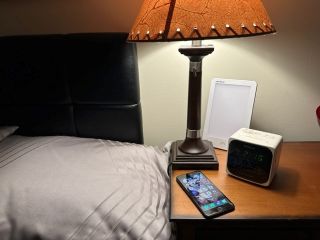SLEEP-Social Media and Sleep. How can you prevent social media from stealing sleep hours? Reviewed by Ray Parker

KEY POINTS-
- Social media is used by children and adolescents before bed and during the night.
- The use of social media is often arousing and incompatible with going to sleep and staying asleep.
- While limiting social media use at night is challenging, we should keep trying.

There is widespread consensus among sleep experts, pediatricians, and parents that most children and adolescents are not getting sufficient sleep to allow them to function optimally during the day.
Poor sleep has been linked to academic underachievement, poor socioemotional regulation, and health problems. While the research linking poor sleep to these problems has been accumulating and getting stronger, there have been few solutions that have been proven to result in better sleep.

Remedies for Poor Sleep in Children and Adolescents
One remedy that I have written extensively about is the movement to have middle and high schools start later to allow more morning sleep for adolescents who stay up late at night. A considerable number of school districts have changed to later start times, and the evidence so far shows that there are many positive benefits. That said, more research is needed, particularly long-term studies that determine whether the positive results are long-lasting.
Another remedy has been to encourage better sleep hygiene in youth. Sleep hygiene refers to all of the factors that facilitate sleep, such as maintaining a bedtime early enough that allows for sufficient sleep, having that bedtime be consistent during the week including weekends, establishing a good sleep environment of temperature, noise, and light, avoiding late meals and late exercise, and numerous others.
One suggestion that has been frequently suggested is limiting the nighttime use of devices with screens, including televisions, gaming consoles, personal computers, tablets, and smartphones. Parents are advised to monitor and regulate the use of these devices, but compliance for those who are willing and able to try has been hard to establish and continue.
The problems that screen usage at night create are primarily twofold. One is that exposure to blue light from the screens may suppress the release of natural melatonin necessary for falling asleep.
The biggest culprit, though, is that excessive cognitive and emotional stimulation is counterproductive for getting to sleep and staying asleep. Scrolling through social media, reading posts, making comments replying to posts, “liking” posts, and so on takes time and energy at times when it is best to be settling down for sleep.
Most of the apps are designed to keep your attention longer and longer. Some information read and seen on social media may be emotionally arousing in both positive and negative directions.
Adolescents increasingly want to be connected via their social media during all waking hours to follow their friends’ activities and messages, and many leave their smartphones on while they are sleeping, and wake when messages come in during the middle of the night. Fear of missing out is often mentioned as a reason smartphones are left on during the night. For a recent review of the effects of social media on youths’ sleep see Alonzo et al. (2021) in Sleep Medicine Reviews.
The problems created by smartphone usage at night for children and adolescents are an example of unintended consequences created by the developers and marketers of these devices. Either or both of the two possibilities occur to me.
One, they did not consider that the use of the products would cause this kind of harm, and two, it was considered at some point during the years of development and was deemed unimportant and a hindrance to selling the devices and software that runs them.
Given the power of marketing and the appeal of smartphones, surveys indicate that around 95 percent of teenagers own one. I’ve tried to think of ways to help adolescents and their parents manage nighttime usage better.
Bear in mind that these suggestions require compliance, and in many cases, there will not be an inclination to follow them.
How to Help Adolescents Manage Nighttime Smartphone Usage
Many commercial devices are now available at a reasonable price to track sleep. Many of the devices allow measurement of the time it takes to fall asleep, overall sleep duration, and the number and length of nighttime awakenings.
Users can be encouraged to keep track of these metrics and work to improve them (longer sleep, falling asleep faster, fewer and shorter awakenings). Goals and rewards may be set to motivate compliance.
The smartphones themselves have features that report the number of minutes and hours the smartphone is used for categories of use. Daily data could be tracked to reduce the hours used for social media. Again, goals and rewards could be set.
For both of the suggestions, “buy-in” by adolescents is crucial. There are many ways of changing behavior, but unless an individual wants to change, non-coercive methods will be ineffective.
I seriously doubt that adolescents would be persuaded by scientific research showing harm. Demonstrable harm such as failing grades, emotional and health problems pointed out by parents, or self-realized might be effective in some instances. If somehow an adolescent’s circle of friends would decide to all cut down on nighttime usage, a competition could be arranged by them with goals and rewards.
Since attachment to, and approval from friends and peers, is of great importance in adolescence, this could be an activity that works. Having them decide for themselves, rather than being told to do so by adults is key for this idea to work. If at least one of a circle of friends can convince themselves that this is a good idea, they may recruit others.
As has been pointed out before, sleep is one leg of a three-legged stool for health with the other two being diet and exercise. Changing unhealthy diet and exercise patterns is very difficult for persons of all ages.
Habits related to sleep quality are equally hard to change. But the difficulty of the task in these domains should not keep us from continuing to try.
- Questions and Answers
- Opinion
- Story/Motivational/Inspiring
- Technology
- Art
- Causes
- Crafts
- Dance
- Drinks
- Film/Movie
- Fitness
- Food
- Games
- Gardening
- Health
- Home
- Literature
- Music
- Networking
- Other
- Party
- Religion
- Shopping
- Sports
- Theater
- Wellness
- News
- Culture
- War machines and policy

